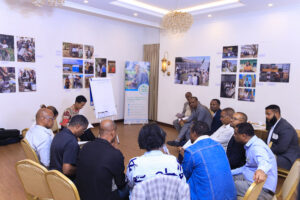Linking & Learning: Alongside the Government of Ethiopia
A recent Linking and Learning Event brought together key stakeholders to accelerate progress toward the ambitious goals of the Seqota Declaration, The Government of Ethiopia's commitment to ending child stunting.

The Seqota Declaration: A Roadmap to End Stunting
Malnutrition and stunting are significant challenges in Ethiopia, impacting the health and development of children. Stunting, where children are too short for their age due to chronic malnutrition, affects millions of Ethiopian children. Stunted children face lifelong consequences: reduced cognitive development, lower educational achievement and decreased earning potential as adults. It’s a challenge that perpetuates cycles of poverty and holds back entire communities.
Ethiopia is committed to eliminating child stunting by 2030 through the Seqota Declaration. This comprehensive, multi-sectoral programme involves various ministries and partners. The declaration outlines a clear roadmap, defining the roles of government, NGOs, the UN, civil society, academia, and the private sector.
The Healthy Village Approach: A Holistic Solution
As Ethiopia moves toward its 2030 goal, the Healthy Village Approach offers a proven model for the next phase. Our approach provides a holistic, integrated strategy that combines water, hygiene, nutrition, and maternal care. Rather than tackling individual problems in isolation, this approach recognizes that child health factors are all closely connected.
We also know that children are healthier when the entire community is committed to safer hygiene, nutrition, and health practices. Positive change is better sustained when communities work in tandem with local government, the private sector, and civil society voices. That’s why we engage all stakeholders in a village to tackle undernutrition and stunting in children under five. This approach aligns perfectly with the Seqota Declaration’s innovative scaling strategy.
Linking & Learning Event: Collaboration in Action
This collaborative approach came to life during the recent Linking & Learning Event in Addis Ababa, Ethiopia in May 2025. Co-hosted by the Embassy of the Netherlands, the Ministry of Health, and Max Foundation, the event highlighted the critical importance of partnership and scalable approaches in achieving the Seqota Declaration’s ambitious goals.
The day included panel discussions with speakers from UNICEF, World Vision, Waterlife, the Seqota Declaration Secretariat, and Max Foundation, as well as in-depth workshops focused on four key themes of scaling:
> System Uptake & Strengthening: Impact only lasts if local governments, communities, and private actors own the solutions. That’s why we’re embedding approaches within woreda (district) plans and budgets.
> Evidence & Learning: Scaling requires more than data. We need usable insights to adapt fast and improve decision-making at all levels.
> Cost-Effectiveness: Safe, affordable solutions that fit local systems are key to scale, not overly complex, donor-dependent models.
> Alternative Finance Mechanisms: Diversifying funding beyond donor support, recognising community contributions, and engaging the private sector.
This event demonstrated what’s possible when diverse actors align behind a shared vision. The pathway to zero malnutrition isn’t just about nutrition interventions — it’s about building resilient systems, fostering authentic partnerships, and creating cost-effective solutions that communities can lead and sustain. The Seqota Declaration shows that with political leadership, evidence-driven action, and multi-sectoral collaboration, we can transform children’s lives at scale. At Max Foundation, we’re proud to contribute to this effort by scaling what works and making it last.
Watch the full video from the event to hear directly from the voices shaping Ethiopia’s journey to zero malnutrition, and learn how the Max Foundation’s Healthy Village Approach is contributing to this transformative national effort.